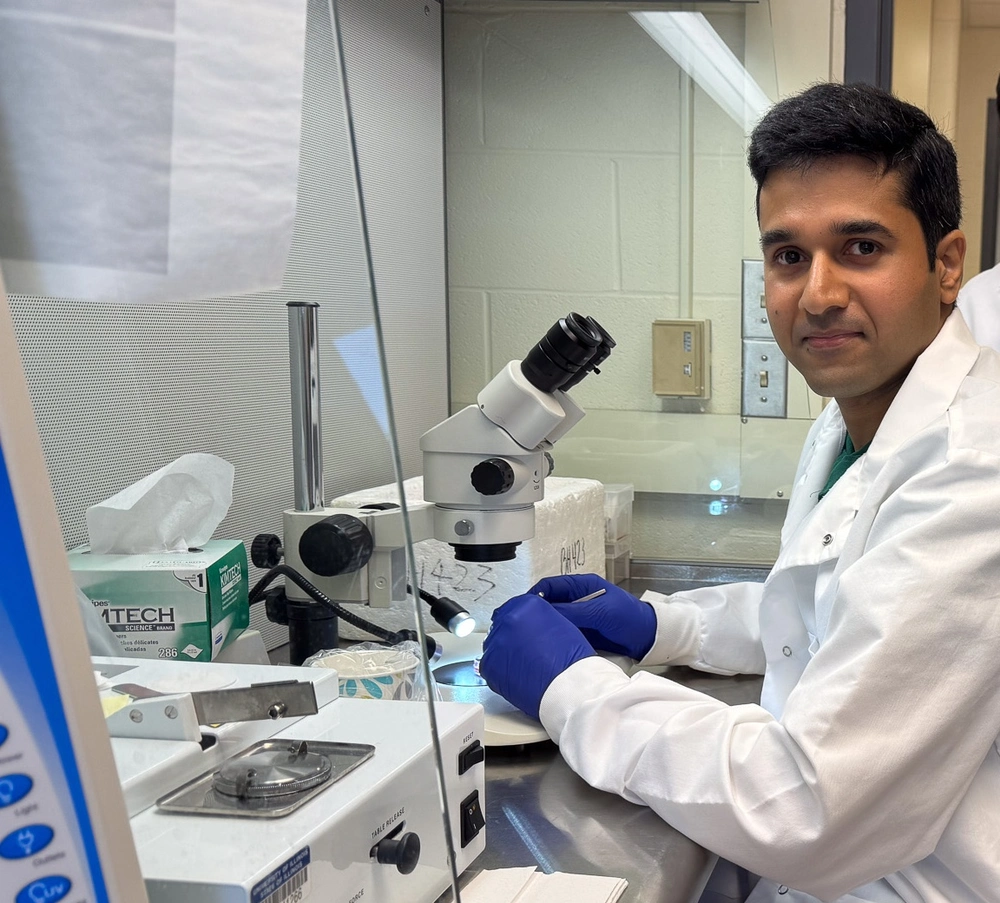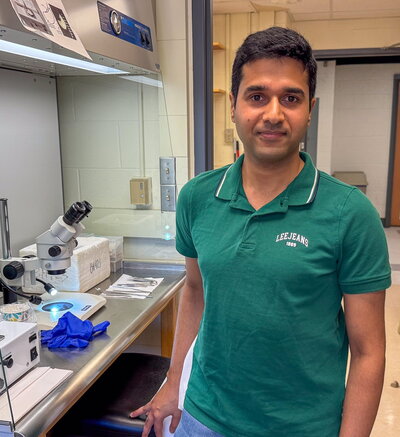
Anirudh Acharya, a postdoctoral research associate in the Department of Molecular and Integrative Physiology, has been awarded a two-year postdoctoral fellowship from the FRAXA Research Foundation to support his research into mitochondrial dysfunction in Fragile X syndrome.
Dr. Acharya’s project focuses on how a key protein, PGC-1 alpha, may influence brain plasticity and energy regulation in Fragile X syndrome, a leading inherited cause of intellectual disability and autism spectrum disorder. His work in the lab of Dr. Nien-Pei Tsai studies the intersection of electrophysiology and molecular biology to better understand how disrupted neural signaling contributes to this condition.
He brings a globally diverse academic background to his work at Illinois. Originally from Mysore, a city in southern India known for its rich history and academic institutions, he completed his undergraduate and master’s studies in zoology at the University of Mysore. There, his early exposure to Drosophila neuroscience research led to a new passion for neurobiology. He went on to earn his PhD at Ghent University in Belgium, where he studied epilepsy using electrophysiology techniques.

“There are a lot of networking opportunities in the U.S., so I started looking here,” Acharya said. “Professor Tsai's lab stood out because he was interested in understanding the hyperexcitability of neurons and exactly how it affects autism, which is his research focus. I was curious to learn more about molecular biology because my skill set was mostly in electrophysiology during my PhD. I was tasked with setting up electrophysiology research for in vivo data collection. I started doing that, and that's how I'm here—learning about it and developing my own ideas about what can be done.”
At Illinois, Dr. Acharya has helped establish in vivo electrophysiology techniques in the lab, combining his expertise in signal processing with new training in molecular biology. His current research examines how neural plasticity differs in mouse models of Fragile X compared to healthy controls and how these changes may be linked to the PGC-1 alpha protein.
“PGC-1 alpha is a curious protein because it does many things. It's a transcriptional co-activator that is required for expression of several different proteins in the brain,” he explained. “If you remove that protein from the brain, it shows plasticity changes in the signals that are similar to those seen in Fragile X syndrome. I started exploring that particular protein more, and the current project that FRAXA has shown interest in is based on that work.”
With support from the FRAXA fellowship, Acharya plans to continue studying how mitochondrial dysfunction may be driving neurological symptoms in Fragile X and whether correcting those deficits could lead to new treatment options.
“Mitochondria controls all the metabolic pathways within the body. It is responsible for generating energy in every cell type and neurons are especially special because they have a unique morphology and the energetic demands are much higher than any other organ in the body,” he said.
Acharya has enjoyed his time in the Tsai lab and the constant opportunity to learn new things. “Dr. Tsai has been very supportive, giving me the freedom to pursue my research interests and helping me establish the tools and techniques I needed to succeed in the lab,” he said.
For Acharya, the FRAXA fellowship is both a personal milestone and an opportunity to make progress in his field.
“There’s always something unknown in the brain. The challenge is figuring out what you’re looking at in context,” he said. “That’s what keeps me motivated—the idea that we can always uncover something new.”
